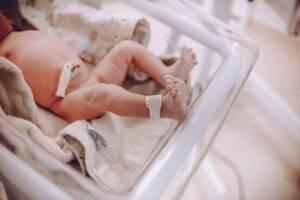Table of Contents

Circumcision in infants takes place soon after the birth of a baby boy. What does this mean? Why is it done? There are plenty of questions surrounding this medical practice. It has since then become a widely accepted surgery.
In a newborn baby boy, the penis is covered with a foreskin. Infant circumcision means removing the foreskin from the penis. As a parent, you would think that this procedure seems to be a heavy toll on a newborn. So many what-ifs hover over your mind!
You might be bothered about the side effects or the associated risks to your newborn’s health and development. In this article, we will help you learn everything you aren’t aware of about this procedure for your newborn baby boy.
Circumcision: A Brief Background
Circumcision dates back in history. In the olden times, it was considered a ritual among ethnic groups of West and North Africa, the Middle East, and Central Asia. Religious beliefs are the main reasons why boys should be circumcised.
Now, in this modern age, backed by science and research, circumcision is done as a medical procedure. It’s an additional surgery for baby boys upon birth. Hence, it isn’t surprising that most parents ask, “Does circumcision hurt the baby or not?”
Due to this phenomenon, most parents don’t allow circumcision. According to WHO, in 2007, only one-third of the population was circumcised baby boys, mostly in Asian countries. On the contrary, US ethnic groups only show a 10% decreasing trend in recent decades.
What Happens During Circumcision?
Circumcision in infants is an optional surgery to eliminate the top layer of skin, also known as the prepuce or the foreskin covering the head of the penis. It is typically done within the initial days after the birth of a baby boy.
The medical services advisor, or your child’s pediatrician, will discuss with you the potential health advantages as well as the associated risks and dangers. In the succeeding section, we lay down the benefits and risks of infant circumcision.
Baby Circumcision is Optional
Parents and some concerned communities can’t help but raise this question: Are circumcisions recommended? Why? Due to a lot of questions brought out, and some issues raised in social forums, infant circumcision is classified as an optional surgery.
Since it’s an optional surgery, parents have written consent on whether or not to proceed with the circumcision for their newborn. Hence, if you’re attempting to settle on a choice, discuss it with your child’s medical services advisor.

Should Your Baby Be Circumcised: The Benefits and Risks
Medical journals and research studies have this to say: Circumcision is safe for your baby. In fact, if you would talk to your child’s pediatrician or any medical professional, they would definitely recommend circumcision for your baby boy.
Fortunately, there are enormous benefits derived from baby circumcision. Firstly, irritation in the penis is significantly reduced or none at all. Secondly, UTIs are common among male infants but with circumcision, the overall risk is less than one percent.
Additionally, research has shown that boys and young men who are circumcised enjoy these advantages in their lifetime:
- Fewer risks of foreskin infections, phimosis, and urinary diseases.
- The possibility of urinary tract infections (UTIs) during adolescence is greatly reduced.
- Less inclined to have penile cancer. Further down the road, the chances are almost negligible.
- Low risk of sexually transmitted infections (STIs) such as herpes, heterosexually acquired HIV, syphilis, and human papillomavirus (HPV).
- Female partners of circumcised men have fewer chances of cervical cancers.
Death of infants due to circumcision is uncommon. Therefore, it’s advised to undergo circumcision if your baby boy is healthy enough due to its enormous health benefits.
On the contrary, issues with the circumcision procedure are typically minor. Complications and related problems are exceptionally uncommon, although they can still happen. We have a list of the risks or drawbacks below.
Surgical Risks
Since the procedure is surgical in nature, there are related risks that go with the process. A lot of bleeding or infection can take place which makes the process risky for a baby.
In as much as the procedure is performed under sterile conditions, contamination from the outlying skin areas can’t be discounted.
Painful
This procedure is excruciating for a baby boy. Analgesia may be applied to ease the pain. However, during instances when no pain-relieving medication is used, the infant reacts by feeling the pressure.
The pain lasts longer and is more severe after the surgery. Irritation may occur in the penis area when urinating lasting for two to three weeks.
There are medications, such as baby circumcision pain relief ointments, that are utilized to help ease the pain though. The infant will show behavioral changes such as crying, and sleeping patterns.
Reduces the Protection of a Penis
During the procedure, the amount of skin removed may be greater than required. Since the foreskin is removed, it reduces the protection of the penis. It may lead to urination problems that are needed to be corrected surgically.
On the other hand, it can also cause long-term irritation when the urinary opening is too small.
Penile Damage
The procedure can cause penile damage. Ensure that the surgery is done by a qualified, experienced medical practitioner to avert permanent damage.
Further Facts You Need to Know About Circumcision
Infant circumcision is a safe surgery if it’s done under legitimate conditions. It should only be performed by an experienced medical professional. Even if any problem occurs, it may not be that serious.
However, it should not be attempted under the following conditions:
- If the newborn is in an unstable health condition or physically sick.
- If the newborn is diagnosed with genital irregularities such as hypospadias.
- Infants with a family history of bleeding issues. Diagnostic tests are done to prove otherwise.

Local analgesics or topical anesthesia must be given to diminish the pain during surgery.
The danger of complications is lower if circumcision is done among infants than in older children. An experienced medical professional utilizing a sterile strategy to limit the dangers must finish the process.
How to Care for Newborn Circumcision
Infant circumcision is a surgical procedure, hence, after-circumcision care for your newborn is the most important part of the process. It’s a highly critical period for your baby which usually lasts for two to three weeks.
Keep everything as hygienic as possible. The skin area operated on is sensitive and the wound may still be open. Hence, it can get easily irritated and could be prone to infection. Keep checking the area to ensure that bleeding should gradually diminish.
Also, be watchful of the baby’s temperature right after and the days after the surgery. He should not develop any fever, otherwise, it may indicate an infection. If continuous bleeding occurs, or increasing redness at the wound area, seek medical help immediately.
After six to eight hours from circumcision, your baby should normally pee. It’s expected that your baby will be crying for the first time after the circumcision. However, if you notice that your baby isn’t urinating after such time or not urinating regularly, call your doctor.
Take extra caution, especially during bath time. Ensure your baby doesn’t feel any discomfort or show signs of getting irritated. If you opt, you can keep your baby under medical supervision until the wound gets dry or until the baby feels comfortable.
It’s highly important to keep the penis area as sterile as possible. Wash with warm water, or soapy water if needed. Avoid using diapers in the meantime. It would be best that the area would not come into contact with cloth since it only induces irritation.
You can still opt for diapers though. You will notice your baby might feel uneasy and discomfort with every diaper change. It’s because the open skin keeps scouring and adhering to the diaper.
It takes usually takes seven to ten days for the penis to recuperate until it completely heals.
Choose to Circumcise Your Baby with a Pediatrician
Wondering if circumcision is safe for your baby boy? Well, we have outlined the benefits your child will enjoy in the long haul. Needless to say, the benefits outlive the disadvantages. The woes of circumcision would only last for a few days or weeks.
It doesn’t matter if you allow infant circumcision due to your religious beliefs or for some other reasons. From a medical standpoint, what matters most is that your baby is safe and well enough that he will not have complicated pain and discomfort arising from the procedure.
Also, in this article, you have learned that in any surgical method, there are risks caused by the procedure. Due to this, after-circumcision care is a vital factor after the process. It is hoped that this post has provided you with the information and cleared your doubts.
We at Omega Pediatrics highly recommend infant circumcision. We take pride in our expertise in child healthcare, hence, rest assured the process is handily managed and safely performed.
We at Omega Pediatrics treat our young patients with care and compassion. Especially for your newborn who has undergone circumcision, we ensure your baby is safe and comfortable throughout the healing process.
FAQ
What is infant circumcision, and why is it done?
Infant circumcision involves removing the foreskin from the penis soon after birth. It’s often performed for religious or cultural reasons, as well as for potential health benefits.
Is circumcision recommended for newborns?
Circumcision is classified as an optional surgery, allowing parents to decide based on their preferences and discussions with medical professionals.
What are the benefits of infant circumcision?
Infant circumcision may reduce the risk of irritation, urinary tract infections (UTIs), foreskin infections, and certain sexually transmitted infections (STIs) later in life. It may also have benefits for female partners and reduce the risk of penile cancer.
What are the risks associated with infant circumcision?
Risks include surgical complications, pain for the baby, reduced protection of the penis, and potential long-term issues such as urinary problems or penile damage.
How should parents care for their newborn after circumcision?
After-circumcision care involves keeping the area clean and sterile, monitoring for signs of infection or complications, and avoiding discomfort during diaper changes. Seeking medical help for continuous bleeding or fever is crucial.




